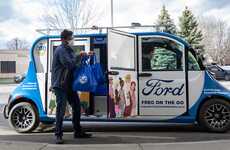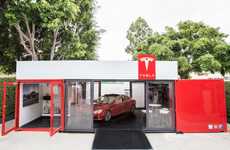
Ford's Car-Sharing Program Introduces the Benefits of Resource Splitting
Laura McQuarrie — July 2, 2015 — Autos
References: media.ford & usatoday
In response to seeing that in general, people around the world are buying fewer vehicles, Ford launched a car-sharing program.
The Ford Smart Mobility initiative involves a Peer-2-Peer Car Sharing pilot program that is set to involve thousands of people in major cities across the United States. Even for those who are not in the market to buy a new vehicle immediately, Ford sees the program as a "bridge to ownership" and a way to raise awareness and loyalty by becoming familiar with the brand through experience.
In its research, Ford found that Millennials are extremely open to resource sharing, especially if it helps to even out the costs of vehicle ownership and offset monthly payments, especially since vehicles spend a lot of time being parked rather than constantly in use.
The Ford Smart Mobility initiative involves a Peer-2-Peer Car Sharing pilot program that is set to involve thousands of people in major cities across the United States. Even for those who are not in the market to buy a new vehicle immediately, Ford sees the program as a "bridge to ownership" and a way to raise awareness and loyalty by becoming familiar with the brand through experience.
In its research, Ford found that Millennials are extremely open to resource sharing, especially if it helps to even out the costs of vehicle ownership and offset monthly payments, especially since vehicles spend a lot of time being parked rather than constantly in use.
Trend Themes
1. Experiential Car Sharing - Creating more accessible experiences for car sharing programs to appeal to younger markets and increase brand loyalty.
2. Peer-to-peer Car Sharing - Increasing vehicle ownership rates by allowing peer-to-peer car sharing programs to make vehicle ownership more accessible and affordable.
3. Shift From Ownership to Access - As more people opt out of car ownership, there is an opportunity to shift to a subscription model that provides access to cars and supports reduced environmental impact.
Industry Implications
1. Automotive - Ford's car-sharing program is indicative of a shift towards more socially conscious, environmentally friendly modes of transportation that rely less on personal vehicle ownership and more on shared access models.
2. Technology - Technology-enabled car sharing programs, particularly peer-to-peer options, offer innovative solutions for urban mobility challenges and create the potential for significant disruption in the car rental industry.
3. Marketing - Experience-based marketing campaigns and brand loyalty programs that target younger generations and emphasize the shared economy, sustainability, and social consciousness can be pivotal in influencing buying decisions and promoting brand recognition and loyalty.
1.8
Score
Popularity
Activity
Freshness























